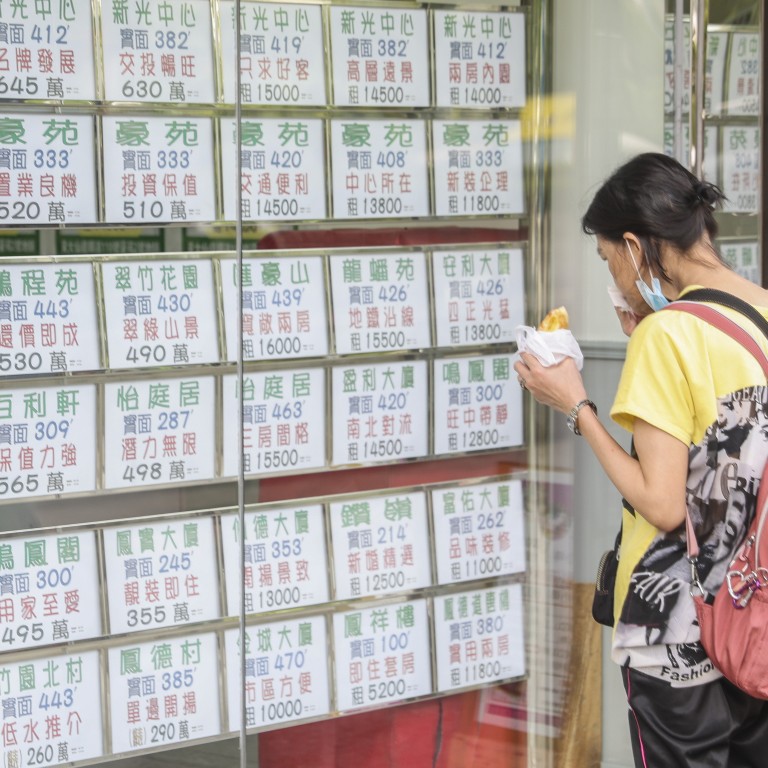
Hong Kong’s negative equity jumps almost 22 times to 12,164 cases, as plunging home prices drive property values below mortgage loans
- Negative equity cases rose to 12,164 at the end of December, from the six-quarter high of 533 cases reported at the end of September 2022
- The Covid-19 pandemic has taken a larger toll on property values than the 2008 global financial crisis or Hong Kong’s 2003 encounter with Sars
Hong Kong’s plunging home prices have driven property values below outstanding loans during the Covid-19 pandemic, driving the number of negative equity cases up almost 22 times to their highest level since 2005.
“The jump in the number of residential mortgage loans in negative equity in the fourth quarter of 2022 is mainly because home prices plunged a further 7.7 per cent in the fourth quarter after falling 8.5 per cent for the first three months,” Arthur Yuen, the HKMA’s deputy CEO, said in a statement.
The aggregate value of residential mortgage loans in negative equity surged almost 22 times to HK$66.25 billion at the end of December 2022 from HK$3.01 billion at the end of September 2022. It is the highest since the fourth quarter of 2003, according to Centaline Mortgage.
These cases were related to bank staff housing loans or residential mortgage loans under the mortgage insurance programme, which generally has a higher loan-to-value ratio.
The mortgage insurance programme has strict requirements on the ability to repay mortgages, said Yuen, noting that the delinquency ratio under the programme is 0.01 per cent, lower than the 0.06 per cent overall mortgage delinquency ratio in the banking industry in December. Thus, the risks of loan services are still under control, he added.
“It is important to note that the figures derived from this survey relate only to residential mortgage loans provided by authorised institutions on the basis of first mortgages, and which the reporting institution knows to be in negative equity,” the HKMA said in its statement. The de facto central bank only counts first mortgages provided by authorised banks and financial institutions, understating the problem by excluding second mortgages provided by co-financing schemes.
Analysts said the industry could see the number fall in the current quarter, as home prices might bounce back driven by the reopening of the border with mainland China.
“Hong Kong’s negative equity cases may decrease this quarter, as the city may see a pickup in the property market in 2023, driven by larger demand after the border reopening,” said Eric Tso, chief vice-president at mReferral Mortgage Brokerage Services.
Covid-19 has taken a larger toll on property values than the 2008 global financial crisis or Hong Kong’s 2003 severe acute respiratory syndrome (Sars) outbreak. The panic wrought by Sars sent home prices into a tailspin, and drove a record 105,697 borrowers into negative equity. During the 2008 crisis, 10,949 borrowers found themselves in hard times.
Home prices in Hong Kong fell last year by the most since the Asian financial crisis, as more than two years of pandemic curbs combined with rising interest rates stopped the housing bull market in its tracks after a 13-year run.
An index tracking lived-in home prices sank 15.6 per cent in 2022 from a year earlier, according to data released by the Rating and Valuation Department on Friday, the most since a 32.5 per cent plunge in 1998. That includes a seventh month of declines in December, the longest losing streak since 2003. The index has slumped 16.5 per cent since a record high in September 2021.
Hong Kong saw 55 cases of residential mortgage loans in negative equity in the three months ended June 30, the HKMA data shows, down from 104 in the three months ended March 31. The aggregate value of these cases stood at HK$300 million (US$38.3 million) versus HK$610 million in the comparable period.
The economy fell into a recession, with output shrinking at an annual rate of 3.3 per cent in the first nine months of 2022. Exports tanked while businesses slumped under some of the toughest Covid-19 curbs in the world. An exodus of expatriates also weakened home demand and prices.
A recovery in market-related wealth might herald a quick recovery this year, some analysts said. The Hang Seng Index has risen 14.7 per cent this year to its highest level in 11 months, its best start to a year since it surged 26 per cent in January 1984, according to Bloomberg data. The city’s stock market has regained US$487 billion of capitalisation in the rally. Mainland Chinese investors bought US$1.7 billion of Hong Kong-listed stocks in the first three weeks of this year.


